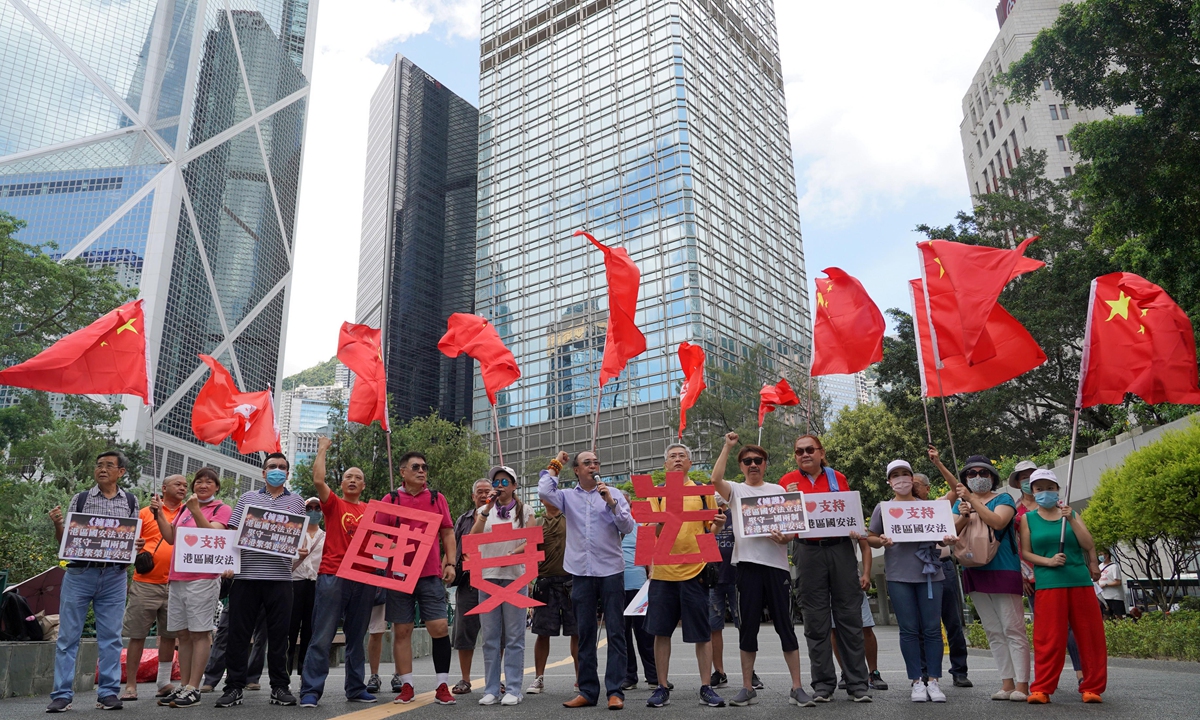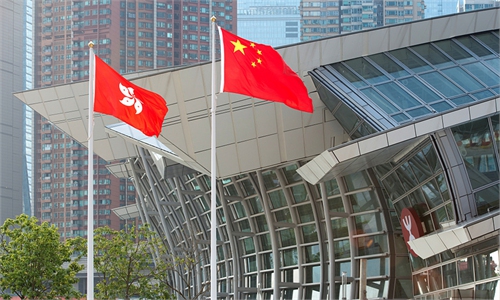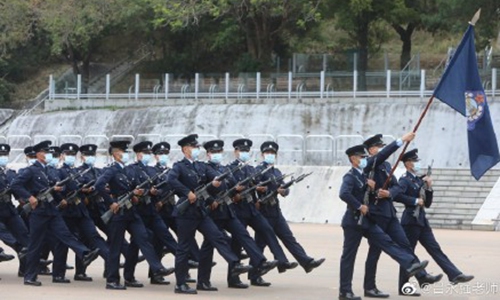Hong Kong marks National Security Education Day, after two legislations return city to peace and security

Hong Kong citizens assemble to support national security law for Hong Kong on June 28, 2020. Photo: VCG
Hong Kong celebrated the National Security Education Day on Thursday for the first time after the national security law for the region took effect in 2020. The city government celebrated the day with a grand opening ceremony and a series of activities, as the special administrative region stepped out of the shade of the previous social turmoil.
Officials speaking at the opening ceremony of celebrations hailed the national security law for Hong Kong and the ongoing reform of the electoral system as a success. They noted that this has ended Hong Kong's history of being undefended as the security law will act as "swords and shields" for maintaining social stability and guarding Hong Kong's future.
The opening ceremony began at 9 am, with hundreds of attendees singing the Chinese national anthem. A number of important political figures were present at the ceremony to celebrate the day.
Carrie Lam, chief executive of the Hong Kong, credited the national security law and the following electoral system reform for stabilizing Hong Kong.
Lam pointed out that the government's past actions to promote national security were demonized. "In the year of 2019, 'black-clad violence,' even terrorist acts, widely spread. There have been messages of secessionism and 'self-determination' spreading in our society, creating anti-China chaos intending to seize power through the election," Lam said, referring to the yearlong social turmoil in the city. "Failure to suppress these threats will bring great risks."
The draft of the amendment bill for Hong Kong's electoral system reform was read for the first time at the city's Legislative Council (LegCo) on Wednesday, just one day ahead of the National Security Education Day. "The draft has made this day more complete," Lam said, "it lays a solid and important foundation for the full implementation of 'one country, two systems,' 'Hong Kong people governing Hong Kong' and a high degree of autonomy."
Luo Huining, director of the Liaison Office of Central People's Government in HKSAR, said the event is an important manifestation of the SAR's responsibility for national security and has an important leading role for the society.
The implementation of the national security law in Hong Kong has ended the history of Hong Kong's undefended security system. It has improved the electoral system and fixed the loopholes of the system that allowed anti-China forces to emerge through elections, Luo said.
"Hong Kong has not only not seen capital outflows as some assumed, but has also become a more stable investment market one year after the national security law for Hong Kong," Luo pointed at the city's development in the past year, which proves security is the basis of development.
Yang Yirui, deputy commissioner of the Commissioner's Office of Chinese Ministry of Foreign Affairs in the HKSAR, said in his speech that the national security law and the ongoing electoral system reform can be a powerful combination to deter external forces from colluding with local anti-China elements to interfere with Hong Kong affairs. This will ensure political stability.
Yang criticized people who have been taking advantage of the loopholes in Hong Kong's system to interfere in China's internal affairs in recent years. These people tried to obtain the right to govern through political agents, engaging in demonization and stigmatization, and slandering Hong Kong's development prospects. He also pointed out that the US has been institutionalizing and normalizing interference in Hong Kong, with the aim of setting up independent and semi-independent political organizations in Hong Kong and turning Hong Kong into a bridgehead for secession and subversion against the country.
Zheng Yanxiong, director of the Office for Safeguarding National Security of the Central People's Government in the HKSAR, thanked the legal professionals, including judges, prosecutors, lawyers and academics, who have supported the implementation of the national security law for Hong Kong.
Aside from the opening ceremony, a lot of activities were going on in the city on the day. Many citizens celebrated the restoration of national security in the city.
Stickers and bookmarks depicting the idea of "upholding national security" have been distributed to the public. Local schools are also expected to hold various activities such as flag-raising and national anthem singing ceremonies in underscoring this subject.
Celebrities also joined the celebration. Lee Ka-yan, a paediatrician who broke into the singing scene with his famous song "Xiaoming Takes the Train," made an adaptation of the song into "Xiaoming Loves the Basic Law" to celebrate the special day. The song aims at promoting the Basic Law and national security awareness.
Students were also an important part of the day. A charity group earlier held a five-month online competition on the national security law for Hong Kong and the Basic Law. Students from 80 secondary schools participated in the competition. And the award ceremony was held on Thursday, local media HK01 reported.
Some of the winning students said they had little knowledge of the national security law before participating. But after searching for information on the internet and reading different reports, they came to the realization that the national security law was necessary for Hong Kong. Liberal studies teachers also used the competition as a preparation activity for liberal studies to arouse students' interest in learning about national security.
Global Times


